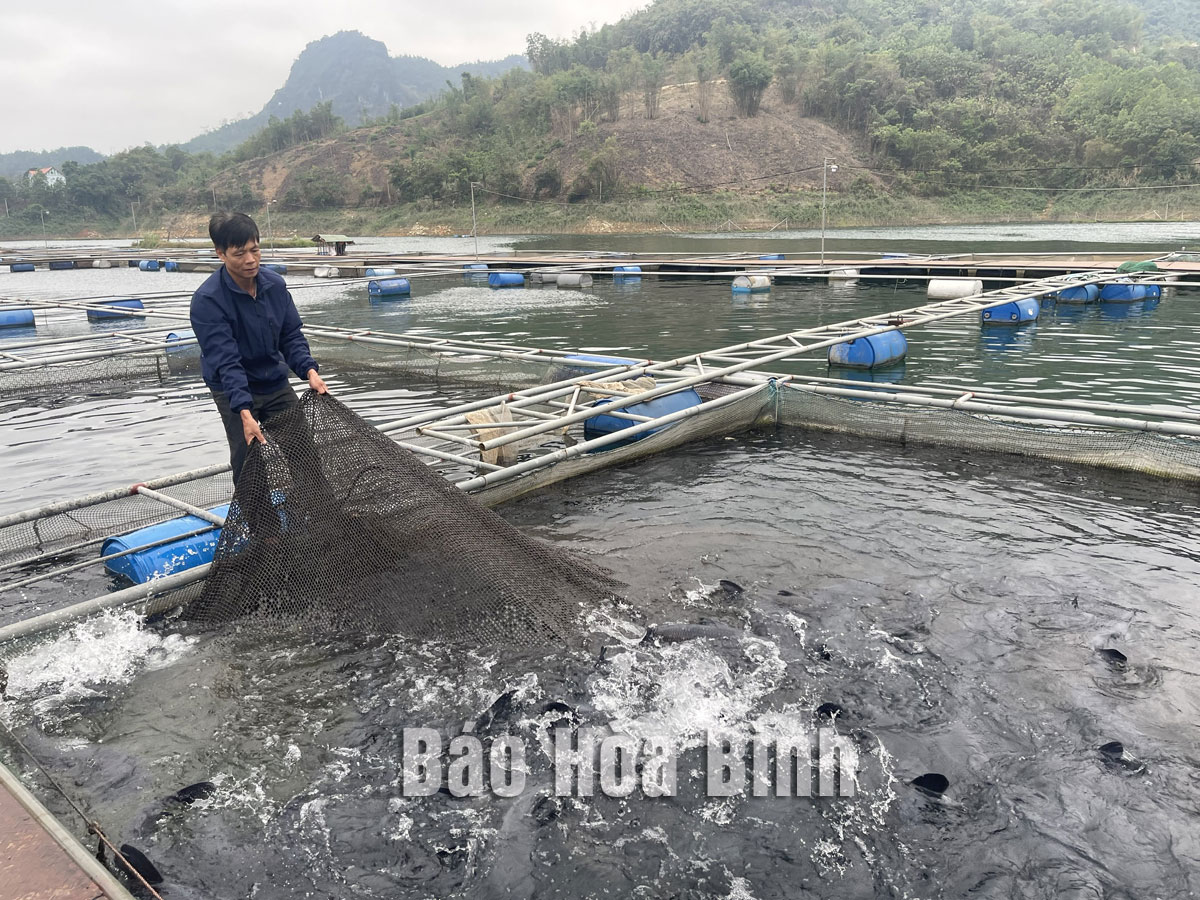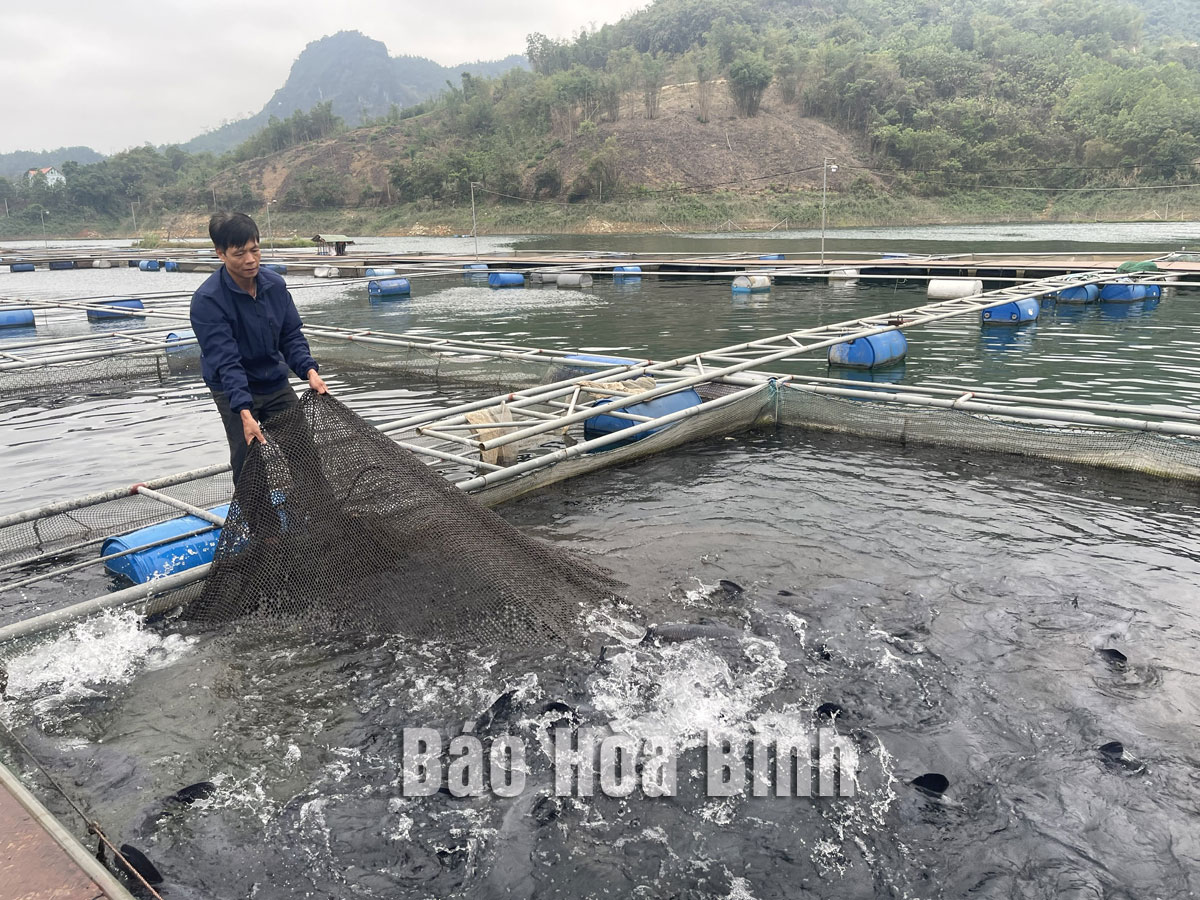
(HBO) – Hoa Binh province currently has 2,695 hectares of water surface and 4,900 fish farming cages. The fish output was estimated at 3,065 tonnes in the first quarter of this year, including 2,577 tonnes of farmed fish.
In recent years, to exploit the potential, protect and develop
aquatic resources, the provincial Department of Agriculture and Rural
Development has directed agencies to accelerate the restructuring of the
fishery sector towards increasing the proportion of aquaculture production,
focusing on specialist species with high quality and value. It has also
promoted the application of farming technology, improved the caring process,
and diversified fish products.
Hung Nguyen
Aquaculture Company in Da Bac district’s Vay Nua commune has 150 fish cages,
supplying more than 200 tonnes of fish to the market each year.
Duong Duc Anh's family, who lives at Moi hamlet in Cao Phong district’s Thung
Nai commune, has engaged in fish farming for 8 years with 80 cages and a total
output of 40 tonnes of fish. However, now his family maintains 50 fish cages
with a production of about 20-25 tonnes a year to ensure their quality.
Pham The Tu from Hung Nguyen Aquaculture Company,which is located in Da
Bac district’s Vay Nua commune, said it has 150 fish cages with an annual
output of more than 200 tonnes.
The company mainly raises different types of catfish such as ca
lang vang (yellowhemibagrus),black carp, andred
tilapia(Oreochromis spp). In order to produce quality products, it has strictly
followed the production process that meets VietGAP standards. Accordingly, the
water source for fish farming is tested regularly to ensure hygiene. The fish
is bred until reaching maturity, assuring that its meat is firm and delicious
when it is supplied to the market.
In recent years, with a large water surface area, especially in the Da River
reservoir, aquaculture is considered one of the province's competitive
advantages. In 2022, with a total output of more than 12,000 tonnes and stable
selling prices, aquaculture contributes a high proportion to the growth of the
agricultural industry.
However, according to the Fishery Sub-Department, although positive changes
have been recorded in the aquaculture industry in recent years, its development
has not been commensurate with the potential of the province.
The introduction of fish varieties with high economic value and specialty
species into farming is still limited due to high input costs, and people still
have difficulty in securing investment for their production.
Obstacles relating to the allocation and leasing of water surface cause
difficulties for small-scale farmers in the registration of farming cages.
The linkage between farmers and businesses is still limited while there is no
plant for post-harvest fish processing and storage, leading to difficulties in
the selling of the products.
Hoang Van Son, Director of the Fishery Sub-Department, said with
great potential from the Da River reservoir, the volume of aquaculture
production in the lakebed area can reach 16,000 tonnes of fish a year.
In the coming time, the fishery sector will review and devise a master plan for
the sector towards safe, efficient and market-oriented production.
It will focus on promoting the strength of the water surface for aquaculture,
applying new technologies to fishery activities to diversify products
andincrease income for farmers.
The sub-department will enhance the prevention of diseases, develop aquaculture
towards diversifying species and farming methods, continue to maintain the area
of fish farming in ponds and small lakes as well as raise fish in fields and
reservoirs.
Awareness of organisations and individuals in the protection and regeneration
of aquatic resources will be enhanced./.
According to data from the Hoa Binh Provincial Party Committee, the industrial production index for the first six months of 2025 is estimated to have increased by 20% compared to the same period last year. This marks the highest year-on-year growth rate for this period since 2020.
In the first six months of 2025, Hoa Binh province’s export turnover was estimated at 1.145 billion USD, marking an 18.11% increase compared to the same period in 2024. Import turnover was estimated at $ 804 million, a 17.15% increase, which helped the province maintain a positive trade balance.
The lives of the ethnic minority farmers in Tan Lac district have gradually improved thanks to the new directions in agricultural production. This is a testament to the collective strength fostered through the professional associations and groups implemented by various levels of the district’s Farmers’ Union.
With the motto the "product quality comes first,” after nearly one year of establishment and operation, Muong village’s Clean Food Agricultural and Commercial Cooperative, located in Cau Hamlet, Hung Son Commune (Kim Boi district), has launched reputable, high-quality agricultural products to the market that are well-received by consumers. The products such as Muong village’s pork sausage, salt-cured chicken, and salt-cured pork hocks have gradually carved out a place in the market and they are on the path to obtaining the OCOP certification.
In the past, the phrase "bumper harvest, rock-bottom prices" was a familiar refrain for Vietnamese farmers engaged in fragmented, small-scale agriculture. But today, a new spirit is emerging across rural areas of Hoa Binh province - one of collaboration, organisation, and collective economic models that provide a stable foundation for production.
Maintaining growing area codes and packing facility codes in accordance with regulations is a mandatory requirement for agricultural products to be eligible for export. Recently, the Department of Agriculture and Environment of Hoa Binh province has intensified technical supervision of designated farming areas and packing facilities to safeguard the "green passport" that enables its products to access international markets.



